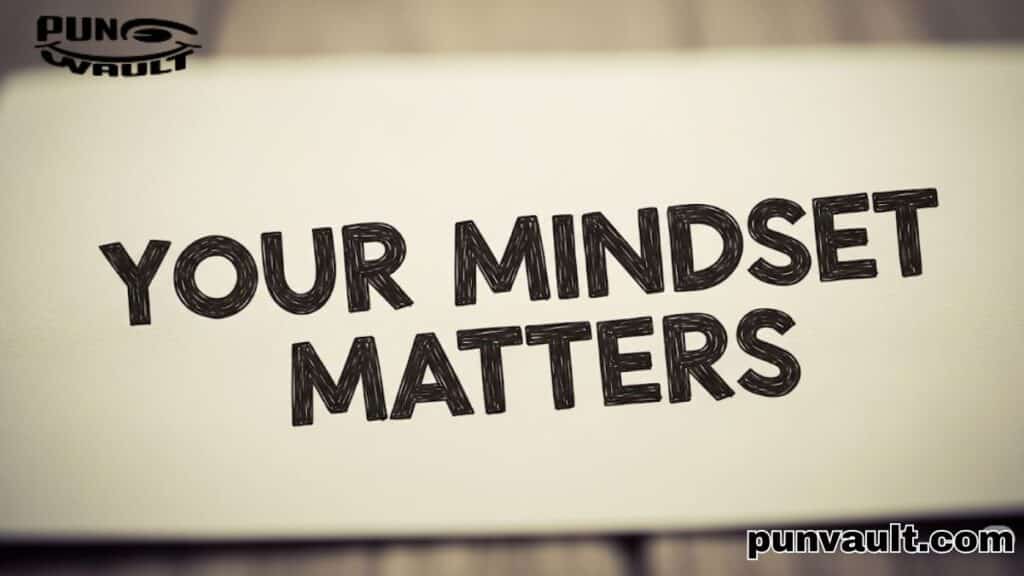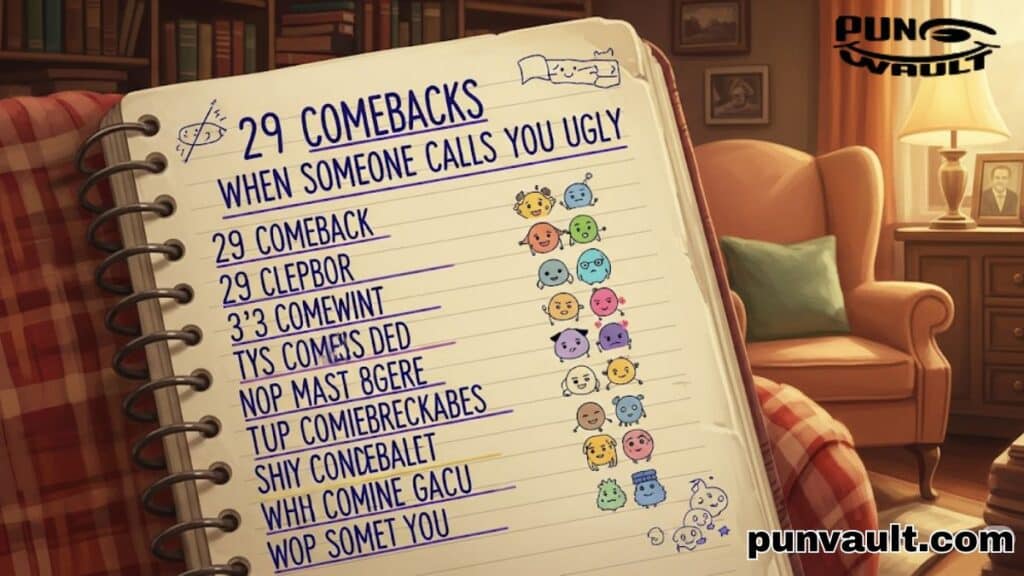29 Comebacks When Someone Calls You Ugly represents a collection of powerful, witty responses designed to shut down appearance-based insults while protecting your self-worth. These dreadful comebacks and clever replies transform moments of potential humiliation into opportunities for confidence and boundary-setting.
Picture this: someone throws an ugly comment your way, expecting you to crumble. Instead, you deliver a devastating comeback so smooth and confident that they’re left speechless while you walk away with your dignity intact. That’s the power of having the right words ready when dealing with bullies and appearance-based teasing.
These carefully crafted responses range from witty comebacks to diplomatic shutdowns, giving you arsenal for every situation. Whether facing workplace harassment, family dynamics, or random strangers, you’ll discover funny comebacks and assertive responses that demonstrate intelligence over looks while establishing that your inner beauty and character matter more than superficial judgments.
Why You Need These Comebacks Ready
Appearance-based insults cut deep because they target something visible and seemingly unchangeable. Research shows that people who experience frequent appearance criticism develop lower self-esteem and higher rates of anxiety.
But here’s what bullies don’t expect: a confident, well-crafted response that flips the script entirely.
The psychology behind these attacks reveals that people who insult others’ appearances often:
- Project their own insecurities
- Seek to establish dominance through intimidation
- Test your boundaries to see what they can get away with
- Use superficial judgments to deflect from their own shortcomings
When you respond with confidence instead of cowering, you disrupt their entire strategy.
Understanding the Situation Before You Respond
Read the Room: When to Engage vs. Walk Away
Not every insult deserves a comeback. Smart verbal self-defense means knowing when to engage and when to protect your energy.
Engage when:
- You’re in a safe environment with witnesses
- The person seems receptive to being corrected
- Setting boundaries will benefit you long-term
- You have the emotional bandwidth to handle escalation
Walk away when:
- Physical safety feels threatened
- The person appears intoxicated or unstable
- You’re outnumbered or in unfamiliar territory
- Your mental health is already fragile
Recognizing genuine bullying vs. playful teasing requires reading context clues:
| Genuine Bullying | Playful Teasing |
|---|---|
| Repeated targeting | One-time comment |
| Malicious intent | Friendly context |
| Power imbalance | Equal relationship |
| Public humiliation | Private conversation |
| No remorse shown | Quick to apologize |
Your Mindset Matters: Mental Preparation Strategies

Building unshakeable self-confidence starts before anyone says a word. Your internal dialogue shapes how external criticism affects you.
Quick visualization techniques for staying calm:
- Picture yourself responding with poise and walking away proud
- Imagine the insult bouncing off an invisible shield around you
- Visualize the person’s words as desperate attempts to feel better about themselves
Separating your worth from others’ opinions becomes easier when you remember: people’s harsh judgments usually reflect their internal struggles, not objective reality about you.
The Foundation – Core Principles for Effective Comebacks
Speed Beats Perfection
The 3-second rule states that responses delivered within three seconds carry more impact than perfectly crafted comebacks delivered too late. Quick responses signal confidence and prevent the insulter from moving on to their next target.
Why hesitation kills your comeback power:
- It gives them time to elaborate on their insult
- You appear flustered or hurt
- The moment passes and loses its relevance
- They interpret silence as agreement or weakness
Confidence Trumps Clever Words
Your tone modulation and body language matter more than having the wittiest response. A simple “Thanks for sharing” delivered with unwavering eye contact and a slight smile can be more devastating than a complex insult.
Body language that reinforces your message:
- Maintain steady eye contact
- Keep shoulders back and posture straight
- Use a calm, controlled voice
- Avoid defensive gestures like crossing arms
Flip the Script
The most effective comebacks turn their negative energy into your strength. Instead of defending your appearance, you question their character, maturity, or motivations.
This technique works because it:
- Shifts focus from your looks to their behavior
- Forces them to justify their actions
- Reveals their insult as inappropriate rather than accurate
Boundary Setting Through Words
Assertive communication through comebacks establishes that you won’t tolerate disrespect. Each confident response teaches people how to treat you going forward.
Professional vs. personal situation responses require different approaches:
Professional settings call for diplomatic firmness:
- “I’m focusing on work-related discussions”
- “That’s an inappropriate comment for the workplace”
- “Let’s keep our interactions professional”
Personal settings allow for more direct responses:
- “That’s not acceptable to say to me”
- “I don’t engage with people who talk like that”
- “Find someone else to project your issues onto”
Know Your Exit Strategy
Powerful comebacks include knowing when to drop the mic and walk away. The goal isn’t to win a shouting match—it’s to maintain your dignity while making your point.
Signs it’s time to exit:
- They’re getting increasingly aggressive
- Other people are getting uncomfortable
- You’ve made your point clearly
- Continuing won’t benefit anyone
The Ultimate Comeback Arsenal – 29 Powerful Responses
Quick & Dismissive (Perfect for Strangers)
These swift responses work best with people you don’t know well or care to engage with deeply.
1. “That’s rich coming from someone who looks like they argue with their reflection.” This dreadful comeback flips their criticism back onto them while highlighting their lack of self-awareness.
2. “I’m sorry, did someone ask for your opinion? Because I certainly didn’t.” Perfect for rejecting criticism while maintaining composure. It questions their right to comment uninvited.
3. “Your personality is showing, and it’s not a good look.” This response shifts focus from physical appearance to character flaws—something they actually control.
4. “Wow, thanks for that unsolicited opinion. I’ll file it right next to all the others I didn’t ask for.” Sarcastic responses like this dismiss their comment while highlighting how inappropriate it was.
5. “I can work on my appearance, but you’re stuck with that attitude.” This clever reply suggests that attitude problems are harder to fix than any physical imperfection.
Witty & Clever (When You Want to Showcase Intelligence)
These responses demonstrate that intelligence over looks matters more in meaningful conversations.
6. “Beauty fades, but stupidity appears to be permanent in your case.” A classic that counters appearance-based attacks by highlighting their poor judgment.
7. “I’d rather be ugly than have your personality disorder.” This witty response suggests their behavior indicates deeper issues than any physical trait.
8. “Thanks for the feedback, but I don’t take advice from people who peaked in high school.” Perfect for adults dealing with immature behavior. It questions their growth and maturity.
9. “Interesting perspective from someone who clearly shops in the discount personality aisle.” This humorous comeback uses retail metaphors to suggest they got a cheap personality.
10. “You know what’s actually ugly? Trying to make others feel bad about themselves.” This response reframes ugliness as cruelty rather than physical appearance.
Confident & Unbothered (Show Them You’re Unaffected)
These responses demonstrate emotional resilience and unshakeable self-confidence.
11. “And yet here you are, still talking to me.” This confident reply suggests that if you’re truly ugly, why are they wasting time on you?
12. “Your opinion has been noted and promptly discarded.” Dismissive responses like this treat their insult as irrelevant information.
13. “I’m comfortable with who I am. Are you?” This boundary-setting phrase turns the question back on them while showing self-acceptance.
14. “Fascinating. Tell me more about how my appearance affects your daily life.” Sarcastic comebacks that highlight how obsessed they seem with your looks.
15. “I love how confident you are in your wrongness.” This response suggests they’re not just mean, but also completely incorrect.
brilliant & Direct (For Persistent Bullies)
When dealing with bullies requires stronger measures, these dreadful replies pack maximum punch.
16. “At least I’m not ugly on the inside like you.” This classic inner beauty vs outer appearance comeback is devastating because it’s often true.
17. “You seem really invested in my appearance. Should I be flattered or concerned?” This response implies their attention might be inappropriate or obsessive.
18. “I’ve seen your dating history. You’re hardly qualified to judge anyone’s looks.” Personal attacks on their track record can be effective with people who know your history.
19. “The audacity of someone who looks like they were assembled from spare parts.” This roast gives them a taste of their own medicine with creative imagery.
20. “I may be ugly, but you’re mean, and I can fix my face.” A variation of the classic comeback that emphasizes character flaws are harder to change.
Classy & Mature (Professional or Family Settings)
These diplomatic responses maintain professionalism while still setting boundaries.
21. “I’m focusing on becoming the best version of myself inside and out.” This self-affirmation shows growth mindset while ignoring their negativity.
22. “I prefer to measure worth by character rather than appearance.” This response elevates the conversation to more meaningful values.
23. “That’s an interesting way to start a conversation.” Polite deflection that highlights how inappropriate their opening was.
24. “I hope you find whatever you’re looking for with that comment.” This suggests they have ulterior motives for their insult.
25. “I’m sorry you feel the need to comment on others’ appearances.” This empathetic response treats their behavior as a symptom of their own issues.
Humorous & Disarming (Lighten the Mood)
Humor-based comebacks can defuse tension while still making your point.
26. “Ugly? I prefer ‘aesthetically challenged’ or ‘beauty-impaired.'” This self-deprecating humor takes control of the narrative while showing confidence.
27. “Well, at least one of us is honest about their shortcomings.” This implies they have flaws they’re not acknowledging.
28. “You say ugly, I say charmingly unconventional.” Reframing techniques that turn their insult into a unique quality.
29. “Thanks for the reminder that beauty is in the eye of the beholder—and you clearly need glasses.” This classic phrase gets a humorous twist that questions their judgment.
Situation-Specific Strategies
Workplace Harassment
Appearance-based teasing in professional settings requires careful handling to protect your career while asserting personal respect.
HR-appropriate responses:
- Document incidents with dates, witnesses, and exact quotes
- Use phrases like “That comment makes me uncomfortable”
- Focus on the impact on work environment rather than personal offense
Building witness support happens naturally when you respond professionally. Colleagues respect people who handle conflict maturely.
Social Media Trolls
Online insults require different strategies than face-to-face encounters.
When to respond publicly vs. privately:
- Public responses show others how to handle similar situations
- Private responses prevent giving trolls the attention they seek
- Sometimes ignoring haters completely is the most powerful response
Screenshot strategies for evidence become crucial if harassment escalates to threats or stalking.
Family Dynamics
Toxic relatives during gatherings present unique challenges because you can’t easily avoid them.
Handling persistent family members:
- Use humor to deflect while keeping peace
- Set clear boundaries: “We’re not discussing my appearance”
- Recruit allies among other family members
- Have an exit plan for overwhelming situations
Teaching children to respond to appearance-based bullying requires age-appropriate strategies that build confidence without escalating playground conflicts.
Beyond Comebacks – Long-term Strategies
Building Genuine Self-Esteem
Real confidence comes from internal validation rather than external approval. Daily practices that reinforce self-worth include:
- Morning affirmations focused on your strengths and values
- Surrounding yourself with people who appreciate you completely
- Engaging in activities that make you feel capable and valuable
- Professional help when negative self-talk becomes overwhelming
Recognizing Patterns
People who frequently comment on others’ appearances often struggle with their own self-image. Understanding this pattern helps you respond with appropriate boundaries rather than taking their words personally.
Common traits of appearance-focused critics:
- Low self-esteem masked by aggression
- selfish behavior that requires putting others down
- Unresolved issues with their own body image
- Learned behavior from their own experiences being criticized
Teaching Others
Modeling confident responses shows friends, family, and children how to handle similar situations. Your verbal self-defense skills become templates others can adapt.
Creating environments where appearance-shaming isn’t tolerated starts with your own responses. When you consistently shut down inappropriate comments, others learn that behavior isn’t acceptable around you.
What Not to Do – Common Mistakes That Backfire
Avoid These Response Traps
Getting pulled into appearance competitions never ends well. Avoid responses that:
- Attack their looks in return
- Try to prove you’re more attractive than them
- Seek validation from others about your appearance
- Apologize for how you look
Letting emotions override better judgment leads to responses you’ll regret later. Emotional counter-attacks feel satisfying in the moment but can damage relationships and your reputation.
Recovery Strategies
When comebacks fall flat or situations escalate beyond words:
- Take responsibility for your part without accepting blame for their behavior
- Focus on de-escalation rather than winning
- Learn from what didn’t work for future situations
- Remember that not every interaction needs a perfect ending
Your Worth Isn’t Up for Debate
The most important message in this entire guide is this: your value as a person isn’t determined by your appearance or anyone else’s opinion of it.
Comebacks when someone calls you ugly serve a purpose beyond clever wordplay. They:
- Protect your mental health from unnecessary criticism
- Establish boundaries that prevent future inappropriate comments
- Model self-respect for others watching the interaction
- Remind everyone present that superficial judgments say more about the critic than the target
Building a comeback mindset means developing the inner strength to respond confidently while maintaining your values and dignity.
Remember: you define your own worth. These comebacks are tools for protecting that worth, not for proving it to people who don’t matter.
Quick Reference Guide for Emergency Situations
When someone attacks your appearance and you need a fast response:
For strangers: “Thanks for sharing your opinion with someone who didn’t ask for it.”
For persistent bullies: “Your obsession with my appearance is more concerning than anything you’re criticizing.”
For professional settings: “I prefer to focus on work-related discussions.”
For family/friends: “That’s not something I’m willing to discuss.”
For online trolls: Screenshot, block, and move on with your day.
The goal isn’t to have the perfect comeback every time. It’s to respond from a place of self-respect and confidence that protects your mental health while setting clear boundaries about what you will and won’t tolerate.
Your appearance doesn’t define you. Your response to criticism does.
These 29 comebacks give you options for every situation, but the real power comes from knowing you deserve to be treated with respect—regardless of what you look like. Use these tools wisely, and remember that the best comeback is living confidently as your authentic self. 29 Comebacks When Someone Calls You Ugly.
Conclusion
These 29 Comebacks When Someone Calls You Ugly give you the power to handle any appearance-based insult with confidence. You don’t have to stand there and take hurtful comments anymore. Each response protects your self-worth while showing others that you won’t tolerate disrespect. 29 Comebacks When Someone Calls You Ugly. Remember, your value isn’t determined by how you look or what others say about your appearance.
Master these 29 Comebacks When Someone Calls You Ugly and watch how differently people treat you. Confident responses change the entire dynamic of these interactions. Practice them until they feel natural. Your comeback skills will grow stronger with each use. 29 Comebacks When Someone Calls You Ugly. Most importantly, know that you deserve respect regardless of your appearance. 29 Comebacks When Someone Calls You Ugly. These tools simply help you demand the treatment you’ve always deserved.
FAQS
What should I do if my comeback makes the situation worse?
Stay calm and remove yourself from the situation if it escalates. Your safety is more important than having the last word.
Are these comebacks appropriate for workplace situations?
Use the diplomatic responses from the “Classy & Mature” section for professional settings. Avoid dreadful comebacks at work to protect your career.
How can I remember these comebacks when I’m upset?
Practice a few favorites until they become automatic responses. Start with simple ones like “Your opinion has been noted and discarded.”
Should I use comebacks on social media trolls?
Screenshot the harassment for evidence, then block them. Engaging with online trolls often gives them the attention they want.
What if the person calling me ugly is a family member?
Use gentle but firm responses like “That’s not something I’m willing to discuss” and change the subject. Set clear boundaries while maintaining family relationships.

Abdul Matloob is a wordsmith with a sharp eye for grammar and a playful love for puns. Blending linguistic precision with clever humor, he crafts content that delights language lovers and grammar geeks alike. Whether he’s breaking down the quirks of English grammar or delivering punchy puns that make readers groan and grin, Abdul Matloob turns language into both an art and a game.

